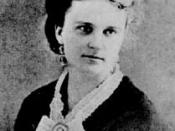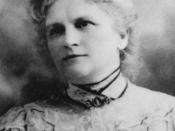In Kate Chopin's The Awakening, Grand Isle society expects women to be subordinate to their children. Edna Pontellier's society flourishes with "mother-women," who, "idolize their children, worship their husbands and esteem it to a holy privilege to efface themselves as individuals". The characters of Adele Ratignolle and Mademoiselle Reisz represent what society views as suitable and unsuitable woman figures. Mademoiselle Ratignolle is the ideal Grand Isle woman, a home-loving mother, and a good wife. The antithesis of Adele is Mademoiselle Reisz, the old, unmarried, childless, musician who devotes her life to music, rather than a man. Edna oscillates between the two identities until she awakens to the fact that she needs to be an individual, but this desire for individuality encounters resistance from the standards of society.
Kate Chopin carefully establishes that Edna does not neglect her children, only her mother-woman image. The women at Grand Isle exude the mother-woman image, but, "â¦Mrs.
Pontellier was not a mother-woman. The mother-woman seemed to prevail that summer at Grand Isle." Edna tries on one occasion to explain to Adele how see feels about her children and herself by saying, "I would give up the unessential; I would give my money; I would give my life for my children, but I would not give myself." Edna's statement specifically contrasts the mother-woman idea of self-sacrifice for husband and child. Edna also realizes that, "somethingâ¦.which is revealing itself" does not become completely clear to her until just before the end, when she does indeed give her life, but not herself for her children's sake. Although Edna loves her children she does not confuse her own life with theirs.
Edna's relationship with her children is similar to her relationship with her husband, Leonce. The Grand Isle society defines the role of wife as full...


